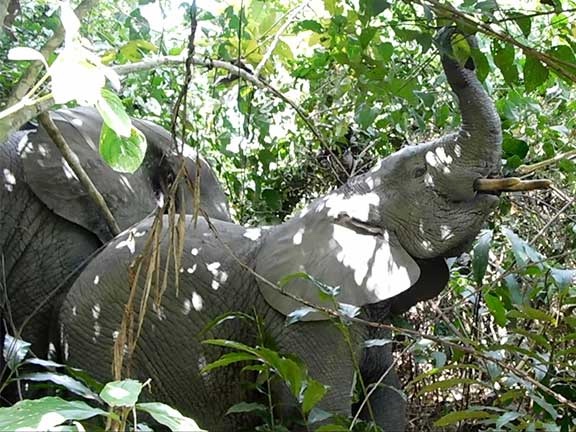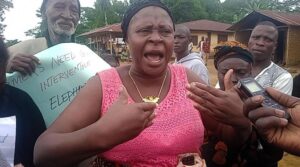

…. Residents threaten ‘unspecific actions’ if elephants continue to trample their farms
An unexpected battle is taking place in Grand Cape Mount County.
The Managorduah belt of Gola Konneh District has quietly flourished for generations, but the repeated invasions of elephants have disrupted their harmonious way of life and left them in despair.
“Our farms and backyard gardens have been swept out by the elephants,” a frustrated Miatta Kandakai, Chairlady of Vargueh Town in the Managorduah belt, says.
“The government is asking us not to kill them, yet we are experiencing substantial financial losses, imperiling our livelihoods, and threatening the future of more than five communities.”
For centuries, the people of Managorduah communities have cherished the beauty of the gentle giants, as their presence symbolized the rich biodiversity of the region.
Protected sanctuaries were established to preserve the habitat, ensuring the coexistence of heritage, culture, and wildlife. Watching elephants roam the vast landscapes became integral to the villagers’ daily lives.
However, over the past decade, the elephants, in their search for food, have approached agricultural lands with increasing frequency, causing severe damage along the way. The consequences have been devastating.
Often, entire farms are left devastated by a single night’s rampage, pushing families further into poverty. Managorduah communities have for generations survived on subsistence agriculture, growing crops such as vegetables and cassava.
The once-peaceful cohabitation has transformed into a battle for survival. And for Kandakai and many other victims, the invasions are reaching a tipping point as towns are being deserted — uprooting families from their homes — and forcing them to settle in places they never dreamt of.
If care is not taken, Kandakai says, they may be forced to take action to protect themselves from prolonged suffering, homeless and jobless.
“Our people are leaving the town because no farming activity is going on again,” Kandakai says. “Some have turned to pit mining and casual labor in other places, as there are no farms.
“The sufferings are unbearable as we do not have a livelihood anymore. We were already poorer than this is happening. The elephants have made some people run away from the town. They say that they will never come back. If the government can not seek our welfare and our wellbeing then we will one day take action.
“The government has not done anything to come to our aid, and they are the ones who are saying that we should not kill the elephants,” Kandaka noted.
Grand Cape Mount has long been a battleground for the human-elephant conflict, and it dates back as early as 2005, but the severity over the recent years has reached unprecedented levels.
Experts say that the increased encroachment of elephants into communities is a result of a shrinking natural habitat caused by deforestation and human encroachment into their territories.
Preservation of both the elephants’ natural habitat and the communities’ agrarian practices, according to experts, is vital in maintaining ecological harmony.
However, efforts to resolve the human-elephant conflict have been underway for several years, with NGOs visiting affected towns and proposing various methods to drive out the giant creatures.
These methods, including burning peppers and dressing human-like statues on farms, have proved unsuccessful.
The situation remains dire, with an estimated 350 to 450 elephants in the Managorduah belt of Gola Konneh District, waiting to cause destruction. Among the affected communities, Vargueh stands out as the hardest hit, with farms in and around severely destroyed along with fruit trees including mango trees munched.
Vargueh, once a lively town has seen its population reduce drastically and forcing its people to become by-force miners and casual laborers elsewhere.
The anger and frustration among people in the Managorduah communities are palpable. And on the streets of Vargueh a few days ago, farmers from all walks of life in the Managorduah belt of Gola Konneh District were on the street protesting invasion and refusing to surrender their livelihoods to towering creatures.
The Forestry Development Agency (FDA) was the main target of their anger, as they called for prompt actions and attention from the government. The invasion, remaining residents of Managorduah belt say, will need them to take unspecific action but will also not participate in the October 10 polls.
“Why should they expect us to vote if we are not at peace?” Lawrence Yarkpawolo of Kpelle Town asked. “We are not going to form part of any election when our problem is not solved.”
“If the government can not seek our welfare and care about our wellbeing then there is no need to vote. So until our situation can be addressed, we will not vote in the upcoming elections.
“We cannot be made homeless without food and you expected us to give power to politicians who don’t care about our wellbeing,” Yarkpawolo says frustratingly.
Elijah Gbanja-Seh, like Yarkpawolo, is of the view that the government is more interested in protecting the elephants for monetary gains, leaving poor Liberians to suffer.
Citing strong laws against the killing of an elephant has an example of government neglect. According to him, the people of the Managorduah belt are seriously suffering and the wave of migration from various affected times is becoming unprecedented.
“The government is not giving the people its attention. The residents need help,” Gbanja-Seh, who is the Executive Director of the Human Rights Group to Save Humanity, says.
“If the government cannot restitute the farmers’ losses, we will be left with no alternative but to take the government, through the FDA, to task,” he says. “The government must restitute the farmers’ losses or we are prepared to take Legal Actions against the Government through the FDA.”
Read the Original Article in the Liberian Observer Newspaper















